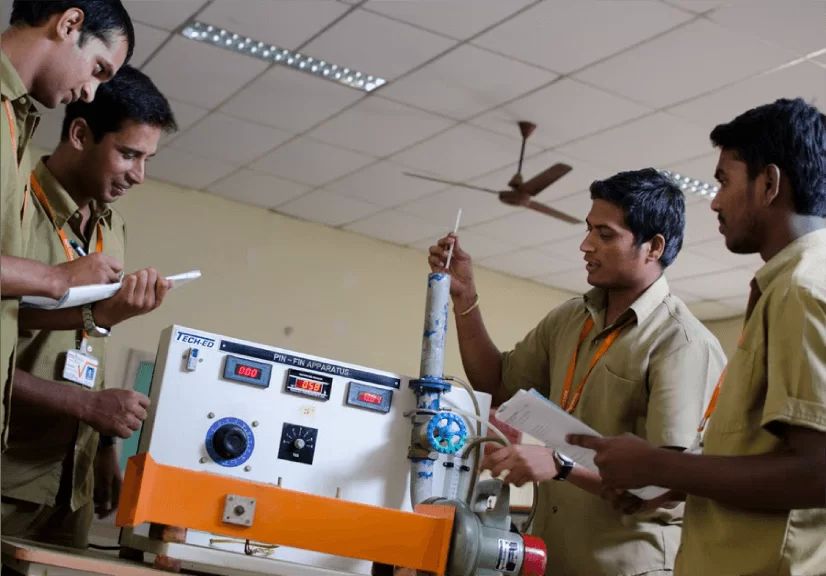Future Career opportunities and scope in Electrical engineering
Mar 21, 2024
Introduction
As a student, you might have multiple questions popping up in your mind. Such as is BTech a good career option after 12th standard? What are the job opportunities and career scope in engineering if you get a degree? Do we even have enough employment in the field of electrical engineering? What to do after I complete my graduation in electrical engineering? Well, if you are also having all of these questions and find it difficult to find the answer, then here’s a blog that will explore the scope in electrical engineering and how you can get a settled job with good pay. You can also explore the top electrical engineering college in Bangalore which will provide you the opportunity to get this degree in electrical engineering.
Current Landscape of Electrical Engineering
Like most of the other professions, the scope in electrical engineering is also directly connected to market economics. Here the market tends to act as the ultimate source of strength which is also responsible for delivering great employment opportunities for newly passed students who are looking to build a career in the respective industries.
Some of the factors which are increasing the demands of electrical engineers especially in industries or companies can be provided as follows:
Growing consumption of electricity
India is considered to be the third largest electrical power systems producer. India is also ranked as the second-largest consumer of electricity worldwide. While there is a lot of electricity power being spent, it is not even enough to meet the growing demands for electricity in India. The country needs rampant electrification which will not only create the demand for more opportunities in this field while also opening up a wider scope in electrical engineering field.
Greater investment opportunities
As per the norms set by the Government of India, 100% FDI or Foreign Direct Investment is allowed in the power sector. This in turn gives foreign organizations the right to invest in this sector. This will also help provide a push for the employment rate and hence open more opportunities in this field.
A great option across the globe
The market conditions set for organizations are suitable not just in India but also anywhere around the world. This has led to an exponential boost to the scope in electrical engineering not just in India but across the globe as well.
Some of the key industries and sectors that are employing electrical engineers can be provided as follows:
- Software and technical solutions
- Automotive industry
- Chemical and pharmaceuticals industry
- Power and energy industry
- IoT and embedded systems
- Aerospace industry
There are certain skills that need to be acquired to be successful in the field of electrical engineering and these can be provided as follows:
- Application of critical thinking skills
- Electrical and instrumentation measurements
- Circuit design and layout
- Interpersonal communication skills
- Participatory learning.
Emerging Technologies Shaping the Future of Electrical Engineering
As technology is continuing to change so is the wave of innovations and updates. This is exactly why electrical engineers need to stay ahead of all of these electrical engineering trends. Well, why is it important? The future of electronics eventually influences not just one but several industries including manufacturing, healthcare, automotive, banking, and finance. In short, regardless of the industry, electrical engineers are responsible for the ways the industry interacts with technology updates. Here are some of the emerging technologies and how they are shaping the future of electrical engineering.
A. Renewable energy technologies
There has been a rise in the need for renewable energy technologies due to the numerous issues that are emerging, particularly with regard to energy usage. Smart grids are one such shift which represents a smarter way to generate energy and plan its distribution and consumption. Smart grids not only improve efficiency but also provide a way to reduce losses and seamlessly engage renewable energy resources by using certain modern sensors, data analytics, and even communication networks.
Electrical engineers who have a specialized degree in grid modernization and sustainable energy solutions are essential to enable a stable and environmentally friendly power systems supply in the future.
B. Internet of Things (IoT) and smart devices
IoT device advancements continue to impact various industries right from manufacturing to healthcare and even agriculture. Electrical engineers have hence become one of the crucial parts of IoT because they tend to enable gadgets to connect, gather data, and act autonomously. Furthermore, those electrical engineers who are well-equipped with IoT applications tend to provide better and creative solutions that help the industries adapt to the changing environment.
C. Electric vehicles (EVs) and infrastructure
Electric vehicles are now part of the fourth industrial revolution which is leading the country to its full potential. As a result, these advances have the potential to create new segments and also provide career opportunities. Students who are learning electrical engineering and are interested in electric vehicle innovation can also specialize in this field with multiple PG degrees being available in automotive electric engineering. This will also in turn bring forward a new generator of electrical engineers who are specialized in green transportation means.
D. Automation and robotics
Automation-based robotics systems are now being criticized for taking people’s work however this is not the case in the field of electrical engineering. Robotics has played quite a significant role when it comes to enhancing security. Instead of replacing humans, it has helped humans to stay away from multiple dangers. Such as using automated wireless underground cable cutters might work better than an actual human being exposed to such dangers.
E. Artificial Intelligence (AI) and machine learning
The incorporation of AI and ML into electrical engineering has led to the arrival of new-age intelligent power systems. Engineers tend to use these AI to manage forecast equipment faults, and power systems and hence improve energy efficiency.
Future Career Opportunities in Electrical Engineering
Electrical engineers definitely have a lot to be excited about in the near future. Some of the latest technologies in electronics are not just what makes electrical engineers excited, instead, there are many more opportunities that are being opened up. Here are a few career opportunities that you can explore as well to get to know how rewarding can choosing electrical engineering be.
Renewable Energy Sector
Electrical engineers are at the forefront of a renewable energy revolution and are strongly leading sustainability in the power sector. This is now possible due to the various innovations and their easy practical applications in daily life. By embracing renewable energy sources and leveraging their experiences they are responsible for paving the way for a greener, clear, and more sustainable future. Some of the few examples through which the renewable energy sector is enhancing are through the following ways:
1. Solar energy systems design and implementation: One of the most applied examples is that of solar energy. Multiple PV cells have been developed by electrical engineers that capture energy from the sun and convert it into clean electricity.
2. Wind turbine technology and maintenance: Electrical engineers are also exploring ways through which wind power can be used as an electricity source.
3. Hydroelectric power generation projects: Another renewable energy source that uses the force of flowing water to create electricity is hydroelectric power.
IoT and Smart Devices
The IoT also commonly called the Internet of Things is a concept that consists of a vast connected network of home appliances, vehicles, physical devices, and other such items. These are the objects that are equipped with sensors, software, electronic components, and actuators and can be connected with each other through multiple connectivity forms. This interconnectedness in turn helps the exchange, collection, and analysis of data that also enables various levels of interaction and intelligence to be established. Some of the common places where IoT is utilized can be provided as follows:
1. Development of smart home systems: IoT enables the integration of home systems which creates smarter, more energy-efficient, and interconnected living spaces.
2. Industrial IoT applications: Smart grids are also changing the ways in which energy is being managed and distributed.
3. Healthcare devices and wearable technology: The convergence of IoT, electrical engineering, and IoT has led to the development of wearable technologies that help track various health parameters.
Electric Vehicles (EVs) and Infrastructure
The growth of electric vehicle production in recent years has led to sustainable transportation options. This rapid expansion is also helping open up a wide scope in electrical engineering where even electrical engineers are hired not just in automotive industries but also in other industries. Some industries where electrical engineers are essential are listed below:
1. Design and manufacturing of electric vehicle components: With the market now improving the new models of electric vehicles, people are expecting more sleeker and improved designs along with working components.
2. Infrastructure development for EV charging stations: Electrical engineers play a very important role in creating advanced charging solutions, which ensures there is seamless integration with the power grid. This should be done with a focus on safety and efficiency.
3. Research and development in battery technology: Electrical engineers also contribute a lot when it comes to increasing battery efficiency, capacity, and charging time. Recycling and re-production of batteries is also one of the ways through which sustainability is being ensured.
Automation and Robotics
Robotics and automation engineering is a field where an engineer needs to be well-versed in the contents of computer engineering, electrical engineering, biological mechanics, mechanical engineering, and software engineering. However this is not all, they also need to be able to use control systems and be very good in information technologies.
1. Industrial automation solutions: Industrial robots help remove any repetitive tasks by automating the process. They can also be used easily alongside humans in the process of industrial production.
2. Robotics engineering for manufacturing and service industries: Robots can assist in automating a variety of tasks in the service industries, including palletizing, welding, and packaging.
3. Autonomous vehicles and drones: Drones and autonomous cars are two recent technological advancements that have opened doors for electrical engineers.
AI and Machine Learning
Recent progress associated with AI and ML has definitely changed the landscape for electrical engineering. The integration of AI and ML in the electrical engineering field has also opened up new chances for boosting system performance while addressing problems more efficiently. Here are a few ways in which AI and ML are contributing highly to the field of electrical engineering:
1. Integration of AI in electrical systems for optimization: Expert systems are now being developed that draw information from a knowledge base. This in turn helps humans to make informed decisions and solves multiple unsolvable problems.
2. Development of AI-powered electrical grid management systems: AI helps in demand forecasting. This is done by analyzing certain patterns in energy usage data, where AI can predict whether the demand will be high or low. This allows the grid operators to know how to balance the supply and demand chain.
3. AI applications in predictive maintenance of electrical equipment: AI helps collect a vast amount of data which consists of predictive capabilities. This can be done by real-time monitoring, historical records, and using sensors.
Education and Training for Future Electrical Engineers
Sounds like electrical engineering is just the field you have always been interested in? Then here are some of the options that you would like to discover to get a degree in electrical engineering.
| Course Type | Criteria for eligibility |
|---|---|
| Diploma in Electrical Engineering | To get a diploma in electrical engineering, the students must have completed Grade 10 with at least 50 percent marks along with clearing the diploma entrance exam |
| BTech in Electrical Engineering | To get admission in BTech in Electrical Engineering, the student must pass Grade 12 with core subjects as either PCB or PCMB and consist of at least 50 percent marks |
| MTech in Electrical Engineering | To pursue MTech in Electrical Engineering, the students must have a degree in BTech |
| Doctorate in Electrical Engineering | The candidate who has passed MTech in Electrical Engineering can apply for the doctorate program |
There are also engineering college in Bangalore that allows these degrees to be obtained. Apart from getting a degree in electrical engineering, it is also important to get appropriate training via internships along with developing proper skills.
Conclusion
Still wondering whether electrical engineering is worth your time and effort? Well, there is undoubtedly great scope in electrical engineering especially if you are particularly looking into this degree. Electrical engineering will undoubtedly be distinguished in the next years by its innovative, sustainable, and cutting-edge technological applications. In addition to addressing some of the most important problems facing humanity, electrical engineers will be driving efforts to enhance the prospects of numerous other businesses.
FAQS:
What is the role of electrical engineering in today's society?
Electrical engineers have a crucial role in designing, prototyping, developing, building, testing, and maintaining various complex electrical components and networks around the world. They are also responsible for the innovations that come up, especially in AI and aerospace fields.
What are some emerging technologies shaping the future of electrical engineering?
Some of the emerging technologies that are changing the landscape for electrical engineering can be provided as follows:
- Machine learning
- Artificial intelligence
- Big data
What career opportunities are available in the renewable energy sector for electrical engineers?
Some of the career opportunities that have now opened up in the renewable energy sector can be provided as follows:
- Sustainability engineer
- Wind turbine engineer
- Energy Engineer
- Nuclear engineer
- Data Analyst
How can electrical engineers contribute to the development of IoT and smart devices?
Electrical engineers design and deploy IoT networks while also ensuring the connectivity and interoperability of various IoT and smart devices.
What roles do electrical engineers play in the electric vehicle (EV) industry?
There are multiple roles when it comes to working in the electric vehicle industry and some of them can be provided as follows:
- Development of vehicle components
- Increasing the efficiency of vehicle battery
- Installing efficient charging stations.








